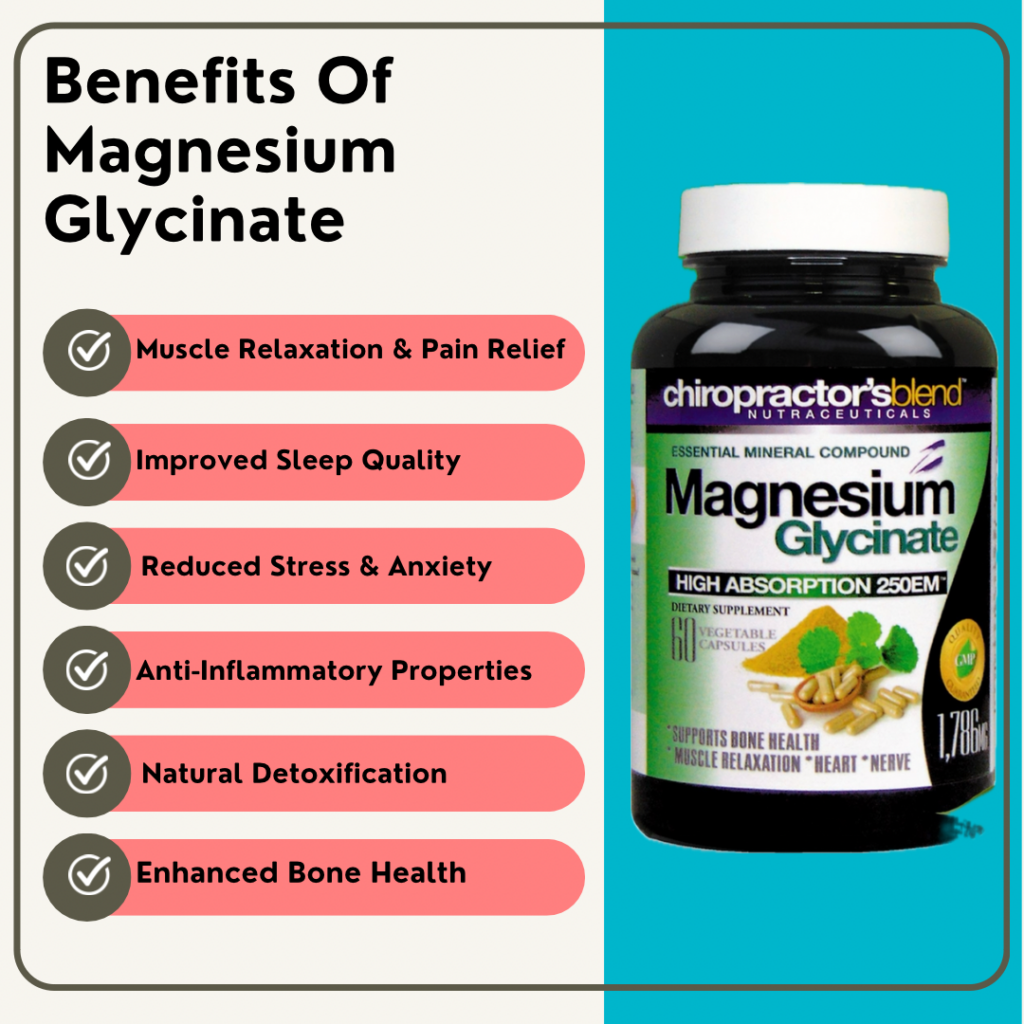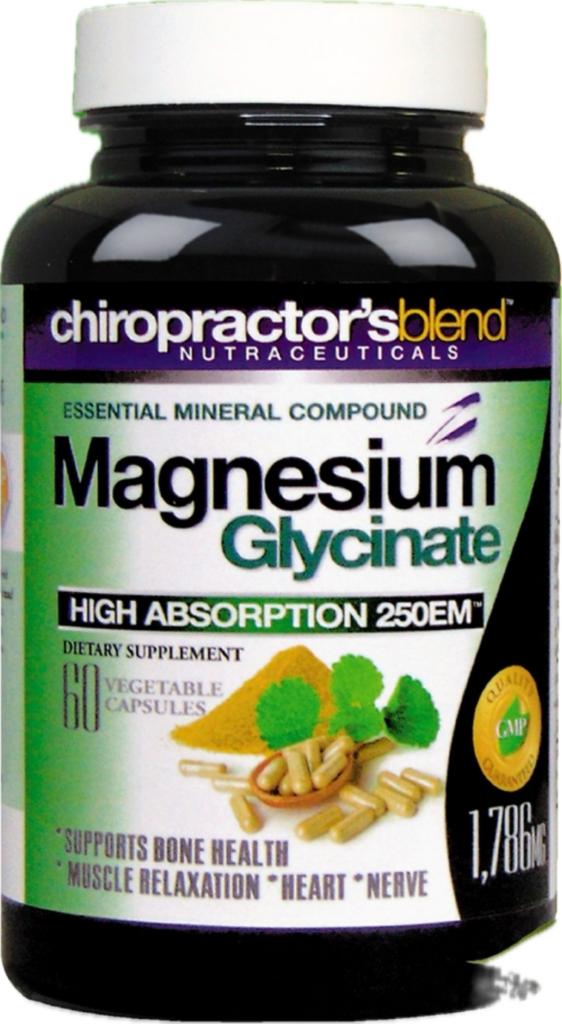At North Myrtle Beach Chiropractic, our goal is to provide exceptional care that exceeds patient expectations. Part of this commitment involves educating our patients on integrative health practices that complement chiropractic treatment. One such practice involves the use of magnesium glycinate, a highly absorbable form of magnesium that offers numerous health benefits.

Understanding Magnesium Glycinate
Magnesium is a vital mineral that plays a crucial role in over 300 enzymatic reactions in the body, including energy production, muscle function, and nerve transmission. Unfortunately, most people are deficient in this essential nutrient due to dietary insufficiencies, stress, and certain medical conditions. The reality is that most of us are stressed and we live in a culture that is known for having high stress levels. We burn through magnesium faster under high stress levels both mentally and physically. You may notice that you burn through magnesium faster when you are more physically active due to higher stress levels on the body. Magnesium glycinate, a compound of magnesium and glycine (an amino acid), is known for its superior absorption and bioavailability, making it an excellent choice for supplementation.
Benefits for Chiropractic Patients

1. Muscle Relaxation and Pain Relief
One of the primary reasons we recommend magnesium glycinate to our patients is its ability to promote muscle relaxation and alleviate pain. Magnesium helps to regulate muscle contractions and prevent cramps and spasms, which can be particularly beneficial for those suffering from musculoskeletal issues. By relaxing tense muscles, magnesium glycinate can enhance the effectiveness of chiropractic adjustments and help maintain alignment longer. This may also make your body easier to adjust because your muscles aren’t resisting the adjustment as much.
2. Improved Sleep Quality
Quality sleep is essential for the body’s healing processes. Magnesium glycinate has a calming effect on the nervous system, which can help improve sleep quality by promoting relaxation and reducing insomnia. Better sleep allows your body to repair and rejuvenate, supporting overall health and enhancing the benefits of your chiropractic care. We have so much working against our sleep between technology and life’s stressors, magnesium can be your ally in reclaiming quality sleep.
3. Reduced Stress and Anxiety
Chronic stress and anxiety can exacerbate physical symptoms and interfere with the healing process. Magnesium plays a crucial role in regulating the body’s stress response by supporting the adrenal glands and balancing neurotransmitters. Supplementing with magnesium glycinate can help reduce anxiety and stress, fostering a more positive mental state and aiding in recovery from chiropractic treatments.
4. Enhanced Bone Health
Magnesium is a key player in bone health, as it aids in the absorption of calcium and vitamin D. Strong, healthy bones are essential for maintaining proper alignment and preventing injuries. By ensuring adequate magnesium intake, you can support your skeletal system and enhance the longevity of chiropractic adjustments.
5. Anti-Inflammatory Properties
Inflammation is a common issue among chiropractic patients (and most Americans in general), particularly those dealing with chronic pain or injury. Magnesium glycinate has been shown to possess anti-inflammatory properties, which can help reduce inflammation and promote healing. This makes it an excellent adjunct to chiropractic care, as it addresses underlying inflammation that may be contributing to pain and discomfort.
6. Natural Detoxification
Magnesium is essential for the body’s natural detoxification processes. It supports liver function and helps the body eliminate toxins by activating enzymes that break down and remove harmful substances. Additionally, magnesium promotes healthy bowel movements, which are crucial for the expulsion of waste and toxins from the body. By supporting these detox pathways, magnesium glycinate helps maintain overall health and prevents the buildup of toxins that can lead to various health issues.
Common Symptoms of Low Magnesium Levels
Recognizing the signs of magnesium deficiency is crucial for addressing it effectively. Some common symptoms include:
- Muscle Cramps and Spasms: Frequent muscle cramps, especially in the legs, can be a sign of low magnesium.
- Fatigue: Persistent tiredness and low energy levels are common with magnesium deficiency.
- Nausea and Vomiting: Gastrointestinal issues, including nausea and vomiting, can occur with low magnesium levels.
- Weakness: General muscle weakness and lack of strength.
- Tingling and Numbness: Tingling or numbness in the extremities can indicate low magnesium.
- Abnormal Heart Rhythms: Magnesium plays a critical role in heart health; deficiency can lead to arrhythmias.
- Mood Disorders: Anxiety, depression, and irritability can be linked to low magnesium.
It’s important to note that blood tests for magnesium levels are not very accurate. The majority of magnesium in the body is stored in bones and tissues, with only a small percentage present in the blood. Therefore, even if a blood test shows low magnesium levels, it indicates that your magnesium stores are extremely depleted.
My Personal Experience with Magnesium
As someone deeply invested in holistic health, I understand the importance of maintaining adequate magnesium levels. I make a conscious effort to take magnesium daily, specifically magnesium glycinate, because of its numerous benefits. However, like many of you, I sometimes fall off the bandwagon and get inconsistent with my supplementation.
When this happens, it doesn’t take long for me to notice. My sleep quality deteriorates, leaving me feeling unrested and irritable. I find myself struggling to fall asleep and/or waking in the night. Mild constipation becomes an issue, a clear sign that my digestive system is out of balance. Malaise and mood issues creep in, and I start experiencing anxiety more frequently. Muscle tension becomes a constant companion, leading to headaches and discomfort. Even my endurance and energy levels take a hit, making it harder to keep up with my usual activities. My daily runs don’t go as smoothly and it’s harder to enjoy them.
This personal experience reinforces the importance of consistent magnesium supplementation. When I stay on track with my magnesium supplementation, I sleep better, feel more relaxed, and maintain higher energy levels. It’s a small daily habit that makes a significant difference in my overall well-being.
The Link Between Chronic Pain and Headaches And Magnesium Deficiency

Throughout my early 20’s, I struggled with chronic pain and severe headaches. These issues were so debilitating that I was prescribed muscle relaxants and prescription-strength pain relievers, but none of them provided much relief. My doctor became so concerned that he ordered an MRI to ensure there wasn’t something more serious going on. Fortunately, the MRI did not reveal any major issues, but my symptoms persisted.
It was during this time, before I started chiropractic care, that I began exploring other options for relief. Although I don’t remember exactly how I discovered it, I eventually started supplementing with magnesium. The relief I experienced was remarkable. The chronic pain and headaches that had plagued me for so long began to subside. Magnesium became like a magic pill for me, alleviating many of the issues I regularly experienced. This personal discovery made me a firm believer in the power of magnesium supplementation.
A Story from My Postpartum Journey
Then in my late 20’s, I had another most profound experience with magnesium when I was five weeks postpartum with my first child. I began experiencing severe gallbladder pain, which led me to the ER two days in a row with a 2 day hospitalization to follow. The symptoms were unmistakably coming from the gallbladder: intense, stabbing pain in the upper right abdomen and right shoulder, severe nausea, and digestive distress. These are classic signs of gallbladder inflammation and gallstones.
Despite undergoing multiple tests, including a CT scan, nothing definitive showed up to indicate that my gallbladder was in trouble. However, the doctors did a series of blood tests and noted that my magnesium levels were low although they didn’t connect the dots that my magnesium deficiency may be causing my gallbladder troubles. Given my long history of magnesium supplementation by this point, I recognized the importance of magnesium and how it may be the major factor creating my gallbladder issues.

During pregnancy and breastfeeding (which I was doing around the clock at this time), the body’s need for magnesium increases significantly. Many common pregnancy complaints and complications, such as fatigue, dizziness/lightheadedness, muscle cramps, pain, insomnia, and preeclampsia, can be alleviated or significantly reduced with adequate magnesium supplementation. I was in a perfect storm of low magnesium levels early on in postpartum, compounded by the hormone surges that put more stress on my gallbladder and liver to detoxify.
I started megadosing on magnesium glycinate malate. Over the next 24 hours or so, the symptoms that had plagued me began to progressively subside. The pain and digestive issues gradually diminished, and I started feeling more like myself again. This experience underscored the critical role magnesium plays in our health and how it can support the body’s natural healing processes. Something so simple, yet had we not figured it out, they may have taken my gallbladder out because of the trouble it was causing me. This isn’t the last time it’s happened and it actually happened around 5 weeks postpartum with my second child. Luckily, that time and others, I remembered to megadose with magnesium and I haven’t had any ER visits or hospitalizations since then.
Choosing the Right Magnesium Supplement
It’s essential to understand that not all magnesium supplements are created equal. Many of the magnesium supplements you find on the market are not of high quality. They often contain types of magnesium that are not easily absorbed by the body, or they are filled with additives and fillers that can be harmful. Here’s what to look for:
- Type of Magnesium: Opt for highly absorbable forms like magnesium glycinate or magnesium malate.
- Purity: Choose supplements that are free from fillers, binders, and artificial additives.
- Reputable Brands: Look for brands that adhere to high manufacturing standards and have third-party testing.

In our office, we have chosen to carry Chiropractor’s Blend Magnesium Glycinate since it’s one of the most bioavailable and absorbable forms of magnesium with great purity and minimal extra ingredients.
Comparing Different Types of Magnesium
Not all magnesium supplements are created equal.If you find yourself asking what is the best form of magnesium to take, here’s a brief overview of various forms of magnesium and their unique benefits:
1. Magnesium Glycinate
- Absorption: High bioavailability
- Benefits: Best for muscle relaxation, sleep, and anxiety relief. Gentle on the stomach, making it suitable for those with sensitive digestive systems.
2. Magnesium Malate
- Absorption: Good bioavailability
- Benefits: Known for its energizing properties. Helpful for muscle pain and fatigue, often recommended for conditions like fibromyalgia.
3. Magnesium Threonate
- Absorption: High bioavailability (particularly in the brain)
- Benefits: Best for cognitive function and brain health. Can cross the blood-brain barrier, supporting memory and learning.
4. Magnesium Citrate
- Absorption: High bioavailability
- Benefits: Effective for constipation relief due to its laxative effect. Use caution not to overdo this type or you will get diarrhea. This is one of the most common forms of magnesium supplementation. It can be good for general magnesium supplementation but is not ideal for those who need it especially for muscle relaxation, pain relief, sleep, mood, and energy. The best option for that would be magnesium glycinate and malate.
5. Magnesium Oxide
- Absorption: Low bioavailability
- Benefits: Often used as a laxative and for relieving indigestion. Less effective for increasing overall magnesium levels.
- This is the magnesium that is generally prescribed by a medical doctor if your blood tests indicate low magnesium levels. It’s essential to note that this has low bioavailability so it will not be very beneficial.
6. Magnesium Chloride
- Absorption: Moderate bioavailability
- Benefits: Good for detoxification and boosting magnesium levels. Can be used topically (magnesium oil) for muscle aches and pains.
7. Magnesium Sulfate
- Absorption: Variable
- Benefits: Commonly known as Epsom salts. Used for baths to relieve muscle soreness and stress. Not typically used for oral supplementation due to its strong laxative effect.
Final Thoughts
At North Myrtle Beach Chiropractic, we are dedicated to providing holistic care that addresses the whole person—body, mind, and spirit. Magnesium glycinate is a valuable tool in our integrative approach to health, offering numerous benefits that can enhance your chiropractic treatment and overall well-being. If you have any questions about magnesium glycinate or other supplements, feel free to ask during your next visit.
By integrating magnesium glycinate into your health regimen, you can experience improved muscle function, better sleep, reduced stress, enhanced bone health, and decreased inflammation. This comprehensive approach helps ensure that you receive the maximum benefit from your chiropractic care, leading to a healthier, happier, and more balanced lifestyle.
For more information and personalized advice, don’t hesitate to reach out to our team. At North Myrtle Beach Chiropractic, we strive to be the best chiropractors in North Myrtle Beach, dedicated to your health and well-being.
Melinda Morris, MOT, OTR/L, CHC
Holistic Occupational Therapist & Integrative Health Coach
North Myrtle Beach Chiropractic
Be The First To Comment